GALLUP NEWS SERVICE
PRINCETON, NJ -- Five years after the Sept. 11, 2001, terrorist attacks against the United States, evidence of the scare it gave to Americans remains, but the effect is less pronounced than it was the first few days after the attacks. Less than a quarter of Americans report that the events of that day permanently changed their lives. And while the majority believes future terrorist attacks are likely, relatively few predict a repeat of the type of attacks that occurred on 9/11.
About one in five Americans (22%) say they have permanently changed the way they live as a result of 9/11, and a little more than half (53%) believe most Americans have changed their lifestyles. This is according to a USA Today/Gallup poll conducted Aug. 18-20, 2006. These perceptions have changed little from when they were first measured in March 2002.
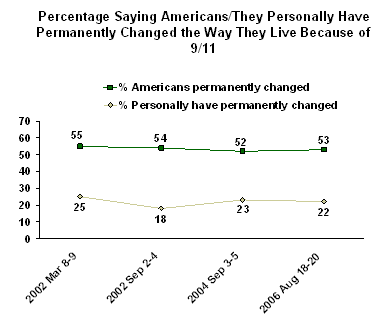
Younger adults (aged 18 to 39 and 40 to 59) are more likely to say their lives have been permanently altered, while those 60 and older are significantly less likely to report such a profound change.
As a result of the September 11th terrorist attacks, have you permanently changed the way you live, or not?
|
Age |
Yes, changed |
No, have not |
|
% |
% |
|
|
18 to 39 |
28 |
72 |
|
40 to 59 |
23 |
77 |
|
60+ |
14 |
86 |
Fear Not Stopping Most From Flying, Entering Skyscrapers
Even in the immediate aftermath of 9/11, a Gallup Poll conducted Sept. 14-15, 2001, found less than half of Americans willing to curtail their participation in several activities associated with security risks highlighted by the 9/11 attacks. Of these, the greatest number of Americans said they were less willing to travel overseas (48%), followed closely by 43% who were less willing to fly. Somewhat fewer said they were less willing to go into skyscrapers (35%) or go to events attended by thousands of people (30%).
By March 2002, the percentages of Americans reluctant to take part in most of these activities had already declined, and today remain at the reduced level or lower for most items. Only unwillingness to travel overseas has not declined since September 2001 -- though the most recent number could reflect concern stemming from the foiled alleged terrorist plot this summer to blow up several U.S.-bound airplanes coming from London.
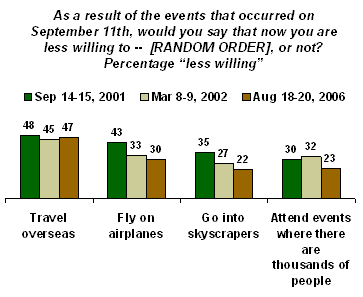
Future Terrorism
Less than half of Americans expect a repeat of the tactics used on Sept. 11, 2001, when commercial airplanes were hijacked and flown into buildings, killing nearly 3,000 people. Thirty-seven percent of Americans think this is likely to occur in the United States within five years. However, many more Americans believe the United States is vulnerable to future acts of terrorism involving suicide bombs (82%) or bombs set off on airplanes (66%).
Close to half of Americans believe terrorists could either shoot down an airplane from the ground, or set off a bomb containing nuclear or biological weapons material.
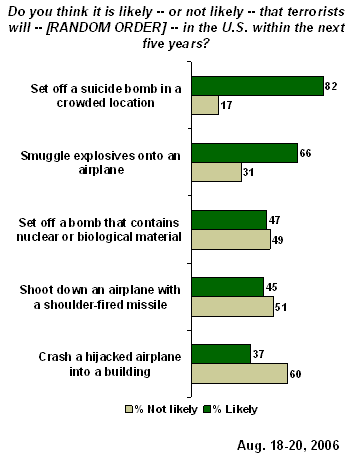
Government Set the Right Tone
From passing the Patriot Act, to instituting a national terrorism alert system, to tightening security procedures at airports, the U.S. government has demonstrated how seriously it takes the threat of terrorism.
Americans seem to agree with this tenor. When asked to think back to how the U.S. government responded to 9/11 five years ago, only 13% say the U.S. government exaggerated the threat to U.S. citizens. The majority, 54%, say the government did a good job in describing the threat, while 30% say it did not go far enough.
Democrats and those who lean Democratic are more likely than Republicans and Republican leaners to believe the government exaggerated the threat (21% vs. 4%), while Republicans overwhelmingly say the government did a good job in describing it (65%). This most likely reflects Republicans' partisan affinity for the Bush administration.
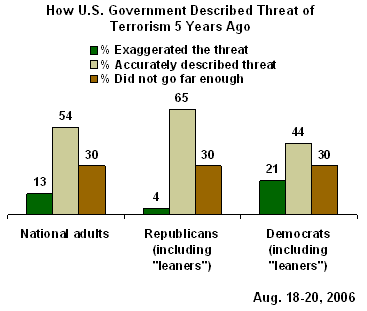
Nearly a quarter of Americans think the media exaggerated the threat of terrorism five years ago, but most still believe they either did a good job representing it or did not go far enough. Republicans have a notably different review of the media on this measure than they gave to the government. Whereas only 4% of Republicans thought the government exaggerated the threat, 30% say the media did.
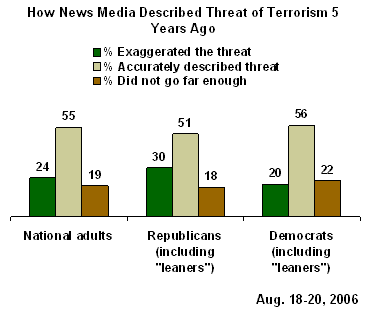
Only Roughly One in Four Has Discussed Plans
Despite the widespread belief that neither the government nor the media exaggerated the threat of terrorism, relatively few Americans indicate they are prepared to respond to a terrorist attack in their local community, should one occur. Only 27% say they and their families have discussed plans for what they would do in the event of such an attack.
Even among those who believe another terrorist attack against the United States is very or somewhat likely, only 30% have discussed a response plan.
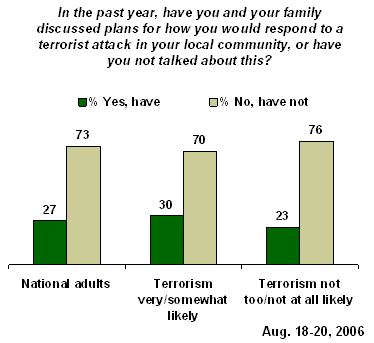
Survey Methods
These results are based on telephone interviews with a randomly selected national sample of 1,001 adults, aged 18 and older, conducted Aug. 18-20, 2006. For results based on this sample, one can say with 95% confidence that the maximum error attributable to sampling and other random effects is ±3 percentage points. In addition to sampling error, question wording and practical difficulties in conducting surveys can introduce error or bias into the findings of public opinion polls.
12. As a result of the September 11th terrorist attacks, do you think Americans have permanently changed the way they live, or not?
BASED ON 500 NATIONAL ADULTS IN FORM A
|
Yes, |
No, |
No |
|
|
% |
% |
% |
|
|
2006 Aug 18-20 |
53 |
46 |
1 |
|
|
|
|
|
|
2004 Sep 3-5 |
52 |
46 |
2 |
|
2002 Sep 2-4 |
54 |
45 |
1 |
|
2002 Mar 8-9 |
55 |
44 |
1 |
|
2001 Sep 11 ^ |
49 |
45 |
6 |
|
|
|
|
|
|
^WORDING: "As a result of today's attacks, do you think Americans will permanently change the way they live, or not?" |
|||
13. As a result of the September 11th terrorist attacks, have you permanently changed the way you live, or not?
BASED ON 501 NATIONAL ADULTS IN FORM B
|
Yes, |
No, |
No |
|
|
% |
% |
% |
|
|
2006 Aug 18-20 |
22 |
78 |
-- |
|
|
|
|
|
|
2004 Sep 3-5 |
23 |
77 |
* |
|
2002 Sep 2-4 |
18 |
82 |
* |
|
2002 Mar 8-9 |
25 |
75 |
-- |
14. As a result of the events that occurred on September 11th, would you say that now you are less willing to -- [RANDOM ORDER], or not?
|
2006 Aug 18-20 |
Yes, less willing |
|
|
|
% |
% |
|
Travel overseas |
47 |
50 |
|
Fly on airplanes |
30 |
67 |
|
Attend events where there are thousands of people |
23 |
72 |
|
Go into skyscrapers |
22 |
72 |
Full Trends:
A. Fly on airplanes
|
|
Less |
|
MORE |
No |
|
% |
% |
% |
% |
|
|
2006 Aug 18-20 |
30 |
67 |
1 |
2 |
|
|
|
|
|
|
|
2002 Sep 2-4 |
33 |
65 |
1 |
1 |
|
2002 May 28-29 |
27 |
69 |
1 |
3 |
|
2002 Mar 8-9 |
33 |
64 |
1 |
2 |
|
2001 Sep 14-15 ^ |
43 |
56 |
* |
1 |
|
(vol.) = Volunteered response |
||||
B. Go into skyscrapers
|
|
|
|
MORE |
No |
|
|
|
|
|
|
|
2006 Aug 18-20 |
22 |
72 |
2 |
4 |
|
|
|
|
|
|
|
2002 Sep 2-4 |
30 |
67 |
1 |
2 |
|
2002 May 28-29 |
27 |
68 |
1 |
4 |
|
2002 Mar 8-9 |
27 |
70 |
1 |
2 |
|
2001 Sep 14-15 ^ |
35 |
63 |
* |
2 |
|
(vol.) = Volunteered response |
||||
C. Attend events where there are thousands of people
|
|
|
|
MORE |
No |
|
% |
% |
% |
% |
|
|
2006 Aug 18-20 |
23 |
72 |
2 |
3 |
|
|
|
|
|
|
|
2002 Sep 2-4 |
29 |
70 |
* |
1 |
|
2002 Mar 8-9 |
32 |
66 |
1 |
1 |
|
2001 Sep 14-15 ^ |
30 |
69 |
* |
1 |
|
(vol.) = Volunteered response |
||||
D. Travel overseas
|
|
|
|
MORE |
No |
|
% |
% |
% |
% |
|
|
2006 Aug 18-20 |
47 |
50 |
1 |
3 |
|
|
|
|
|
|
|
2002 Sep 2-4 |
47 |
50 |
* |
3 |
|
2002 May 28-29 |
43 |
52 |
1 |
4 |
|
2002 Mar 8-9 |
45 |
52 |
1 |
2 |
|
2001 Sep 14-15 ^ |
48 |
48 |
1 |
3 |
|
(vol.) = Volunteered response |
||||
|
^SEPT. 14-15, 2001 WORDING: "As a result of Tuesday's events, would you say that now you are less willing to [RANDOM ORDER], or not?" |
||||
15. Do you think it is likely -- or not likely -- that terrorists will -- [RANDOM ORDER] -- in the U.S. within the next five years?
|
2006 Aug 18-20 |
|
|
|
% |
% |
|
|
Set off a suicide bomb in a crowded location |
82 |
17 |
|
Smuggle explosives onto an airplane |
66 |
31 |
|
Set off a bomb that contains nuclear or biological material |
47 |
49 |
|
Shoot down an airplane with a shoulder-fired missile |
45 |
51 |
|
Crash a hijacked airplane into a building |
37 |
60 |
Full Trends:
A. Shoot down an airplane with a shoulder-fired missile
|
Yes, likely |
No, not likely |
No opinion |
|
|
|
|
|
|
|
2006 Aug 18-20 |
45% |
51 |
4 |
|
|
|
|
|
|
2003 Nov 14-16 |
53% |
45 |
2 |
B. Smuggle explosives onto an airplane
|
Yes, likely |
No, not likely |
No opinion |
|
|
|
|
|
|
|
2006 Aug 18-20 |
66% |
31 |
2 |
C. Set off a suicide bomb in a crowded location
|
Yes, likely |
No, not likely |
No opinion |
|
|
|
|
|
|
|
2006 Aug 18-20 |
82% |
17 |
1 |
D. Crash a hijacked airplane into a building
|
Yes, likely |
No, not likely |
No opinion |
|
|
|
|
|
|
|
2006 Aug 18-20 |
37% |
60 |
4 |
E. Set off a bomb that contains nuclear or biological material
|
Yes, likely |
No, not likely |
No opinion |
|
|
|
|
|
|
|
2006 Aug 18-20 |
47% |
49 |
4 |
16. In the past year, have you and your family discussed plans for how you would respond to a terrorist attack in your local community, or have you not talked about this?
|
Yes, have |
No, have not |
No opinion |
|
|
|
|
|
|
|
2006 Aug 18-20 |
27% |
73 |
* |
It has been almost five years since the terrorist attacks on the World Trade Center and the Pentagon and the incidents in which letters containing anthrax were sent in the U.S. mail.
Q.31-32 SPLIT SAMPLED
31. Thinking back to that time five years ago, do you think the U.S. government - [ROTATED: exaggerated the threat to U.S. citizens from terrorists, did a good job of accurately describing the threat, or did not go far enough in describing the threat to U.S. citizens from terrorists]?
BASED ON 500 NATIONAL ADULTS IN FORM A
|
Exaggerated |
Did a |
Did not go |
No |
|
|
|
|
|
|
|
|
2006 Aug 18-20 |
13% |
54 |
30 |
3 |
32. Thinking back to that time five years ago, do you think the news media - [ROTATED: exaggerated the threat to U.S. citizens from terrorists, did a good job of accurately describing the threat, or did not go far enough in describing the threat to U.S. citizens from terrorists]?
BASED ON 501 NATIONAL ADULTS IN FORM B
|
Exaggerated |
Did a |
Did not go |
No |
|
|
|
|
|
|
|
|
2006 Aug 18-20 |
24% |
55 |
19 |
2 |